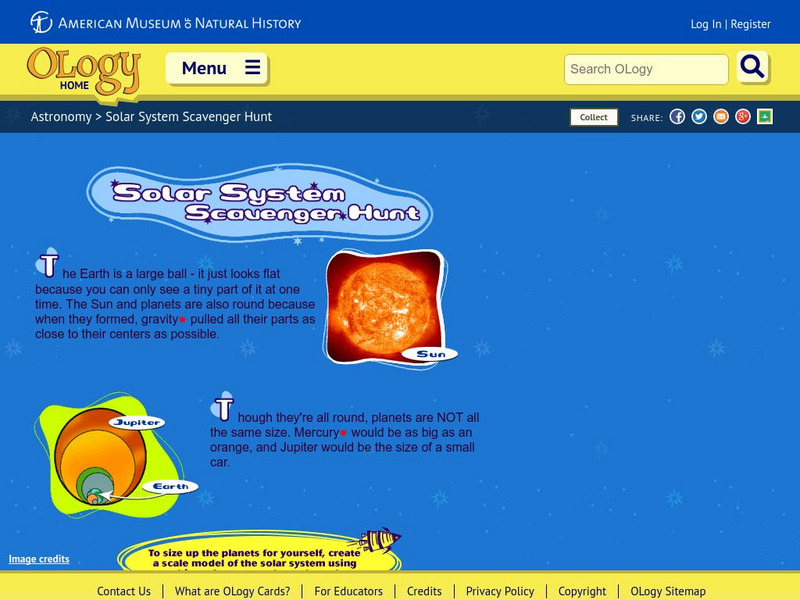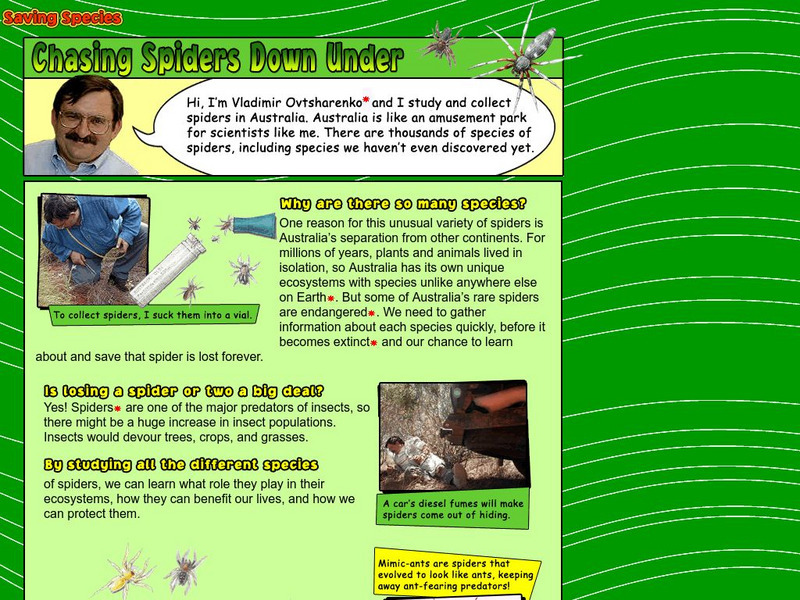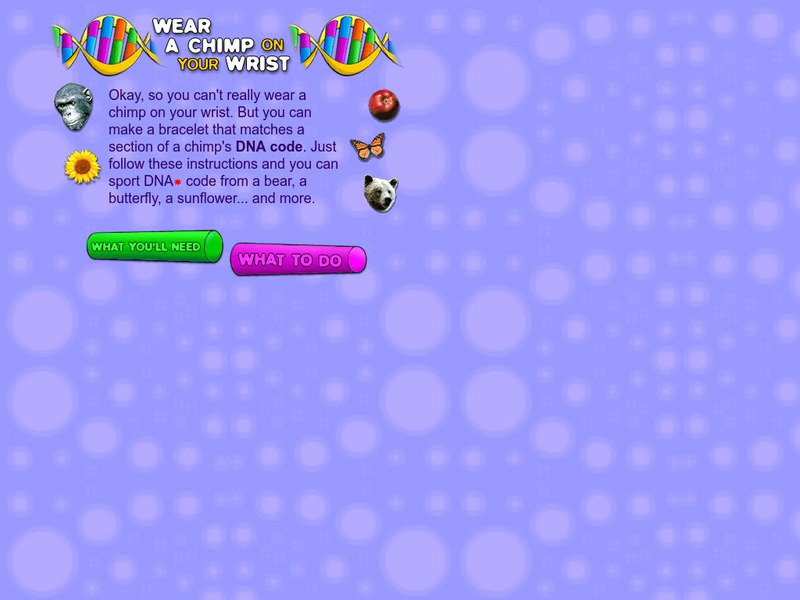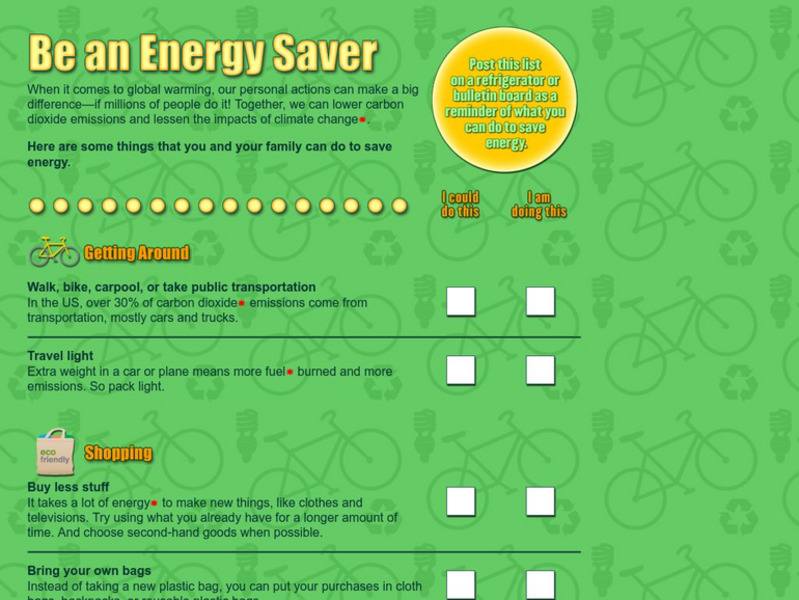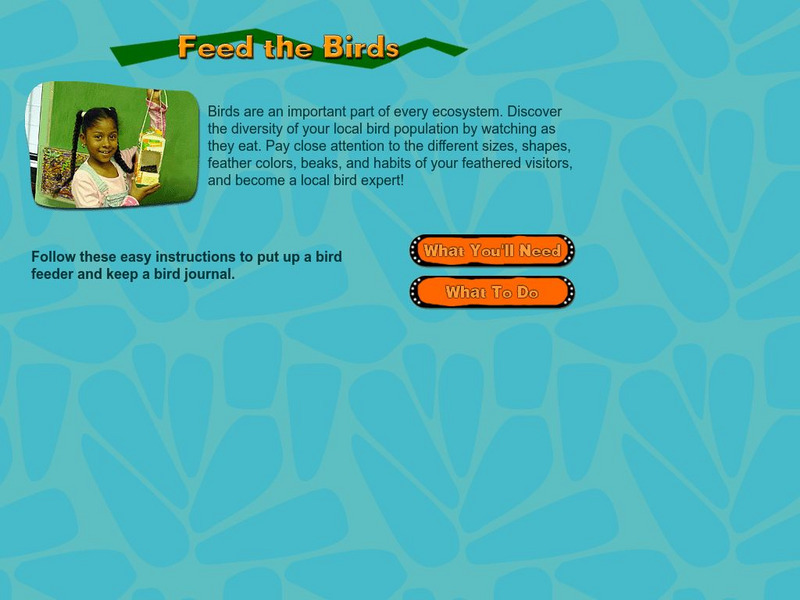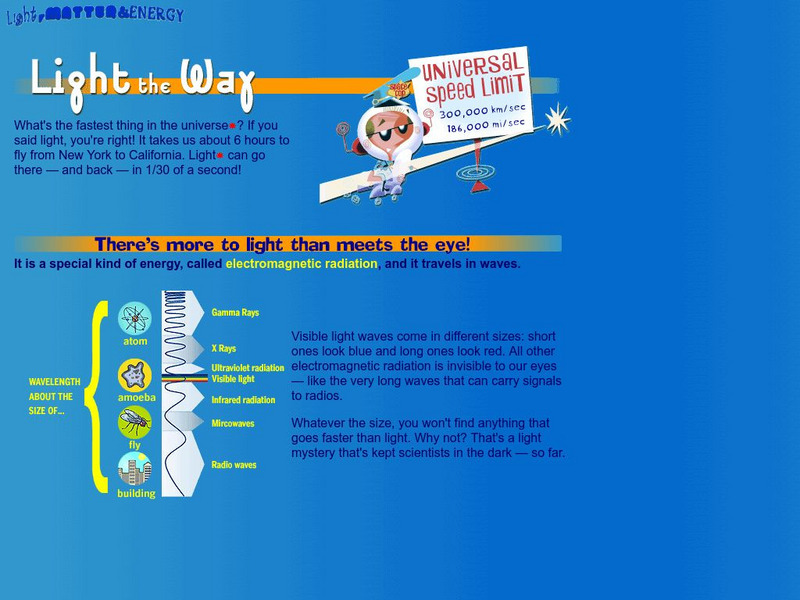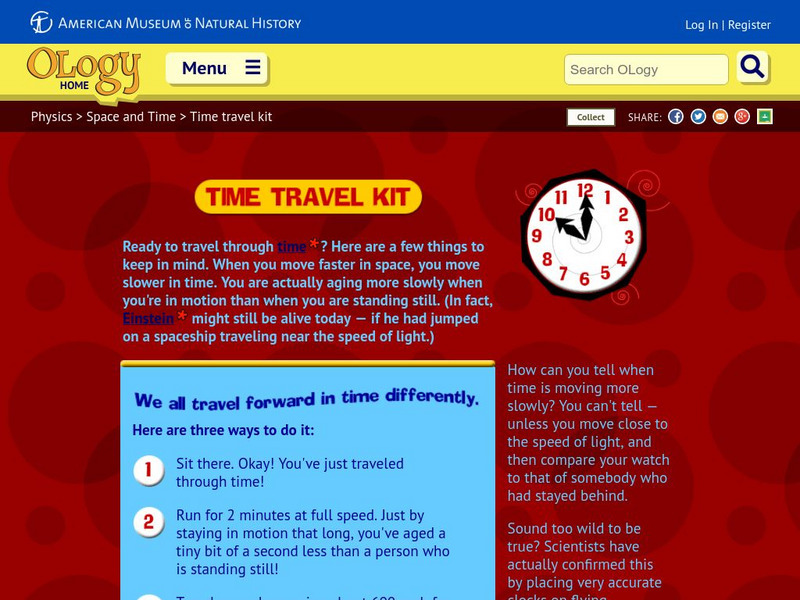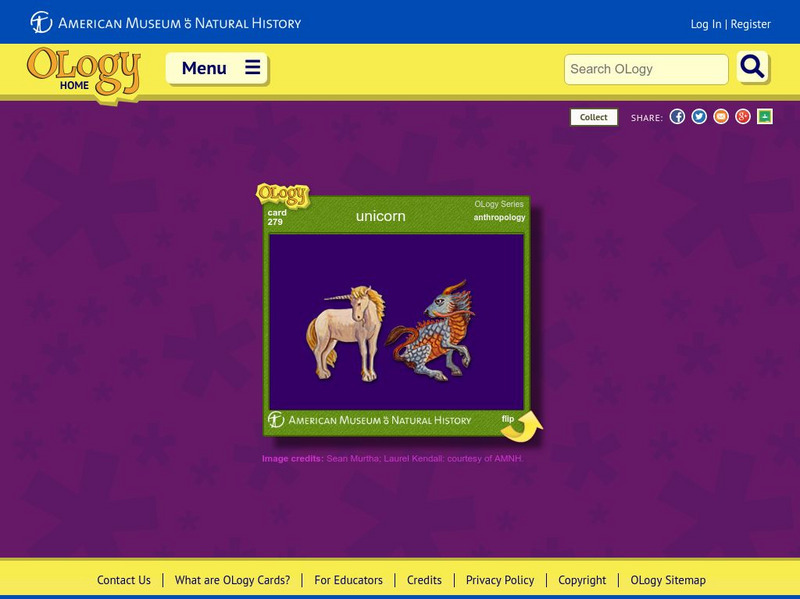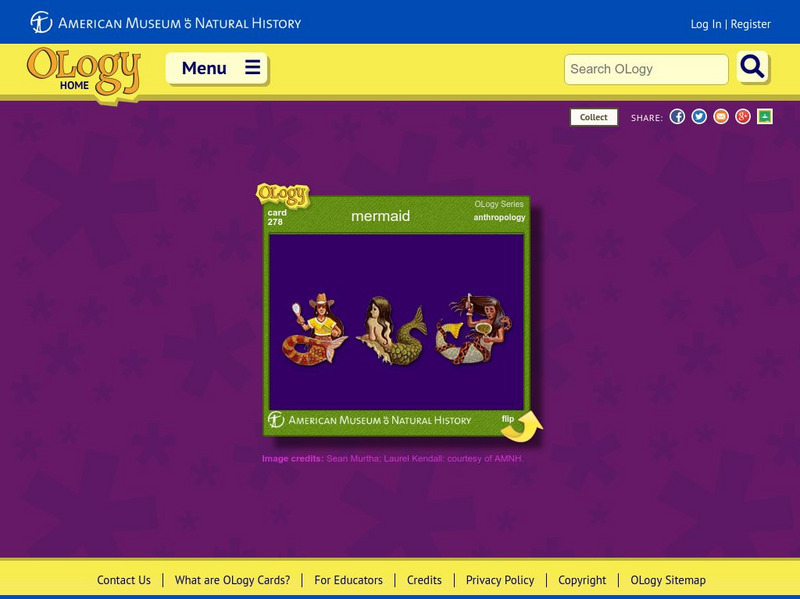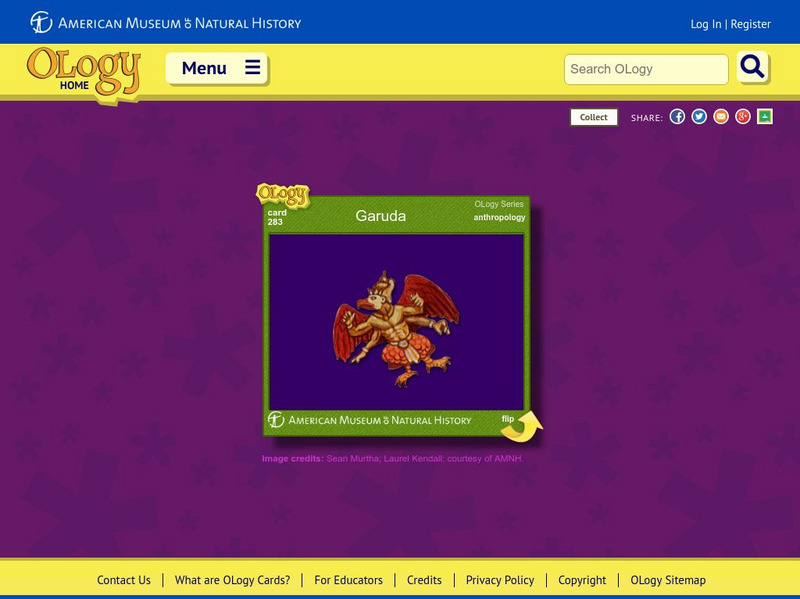American Museum of Natural History
American Museum of Natural History: Rising Carbon Dioxide! What Can We Do?
Energy is used everyday coming from burning fossil fuels which releases carbon dioxide into the air. Discover what this has to do with global warming and how we can do our part to slow it down.
American Museum of Natural History
American Museum of Natural History: O Logy: Stuff to Do: Scavenger Hunt
Illustrated instructions for creating a scale model of the solar system.
American Museum of Natural History
American Museum of Natural History: O Logy: Bahamas: Creatures of the Reefs
Biologist Paula Mikkelsen, who studies mollusks among the coral reefs in the beautiful waters of the Bahamas, explains her work.
American Museum of Natural History
American Museum of Natural History: O Logy: Magnificent Madagascar
Scientist Christopher Raxworthy, who studies the reptiles of Madagascar, explains the nature of his work.
American Museum of Natural History
American Museum of Natural History: O Logy: Chasing Spiders Down Under
Naturalist Vladimir Ovtsharenko explains why Australia is home to so many different species of spiders, why spiders are important, and why spiders should be protected.
American Museum of Natural History
American Museum of Natural History: O Logy: Saving Species
Learn why fieldwork is an important component of any scientist's career, especially among those who are actively working to preserve the Earth's biodiversity. Three American Museum of Natural History biologists tell you about their...
American Museum of Natural History
American Museum of Natural History: O Logy: Stuff to Do: What Makes You You?
Launch an activity that will help you address the nature-versus-nurture debate in terms of your own traits.
American Museum of Natural History
American Museum of Natural History: O Logy: Stuff to Do: Wear a Chimp
Illustrated instructions for a constructing bracelet from a section of the DNA code for a chimp, a sunflower, a grizzly, the human heart, or any one of six other plants or animals.
American Museum of Natural History
American Museum of Natural History: O Logy: Stuff to Do: Be an Energy Saver
Find out what you can do to be an energy saver and help slow global warming.
American Museum of Natural History
American Museum of Natural History: O Logy: Stuff to Do: Feed the Birds
Instructions for building a bird feeder and for keeping a journal of observations about the birds that come to feed.
American Museum of Natural History
American Museum of Natural History: O Logy: Stuff to Do: Drawing Dinosaurs
A tutorial on how to draw a realistic dinosaur starting from a picture of a skeleton.
American Museum of Natural History
American Museum of Natural History: O Logy: Light, Matter, Energy: Light the Way
What is electromagnetic radiation and how does it work? Review a captioned graphic that explains electromagnetic radiation and the visible and invisible types of radiation on the electromagnetic spectrum.
American Museum of Natural History
American Museum of Natural History: O Logy: Stuff to Do: Keeping a Field Journal
Learn how to record observations about the wildlife in your community by constructing a field journal.
American Museum of Natural History
American Museum of Natural History: Ology: Endangered!
After making the gameboard, play this interactive learning game that teaches about "The Endangered Species Act", a law that protects animals and plants that are in danger of going extinct.
American Museum of Natural History
American Museum of Natural History: O Logy: All About Cloning
Learn what cloning is, how it works, what animals have been cloned, and about Dolly, the first mammal (a sheep) to be cloned from an adult cell. Click on the links to see flash cards on the topics.
American Museum of Natural History
American Museum of Natural History: O Logy: Time Travel Kit
Would you like to travel forward in time? Use this time travel kit to help you think through different ways to experience time travel. Click on the starred words to learn more about the topic.
American Museum of Natural History
American Museum of Natural History: O Logy: You Light Up My Life!
Brief explanation of observations that Arthur Eddington used to test Einstein's general theory of relativity. Click on the starred words to learn more about the topic.
American Museum of Natural History
American Museum of Natural History: O Logy: It's All Relative
Learn about the 4th dimensions and the theory of relativity.There is no absolute, or "same," time and space. This means time and space are different for everyone! How you experience events in time and space depends on two important...
American Museum of Natural History
American Museum of Natural History: Microscope O Logy Card
Flip this interactive OLogy card to learn simple facts about the microscope and how it is used.
American Museum of Natural History
American Museum of Natural History: Peru O Logy Card
Turn over this interactive OLogy flash card to learn about Peru, its ancient people and their descendants. Find fast facts, questions and answers, and similar bite-size pieces of information about the country.
American Museum of Natural History
American Museum of Natural History: Petra O Logy Card
Flip over this interactive OLogy flash card to start learning about Petra, an ancient trading center located in modern-day Jordan.
American Museum of Natural History
American Museum of Natural History: O Logy: Unicorn
The unicorn appears in both European and Asian mythologies. Read about the differences in appearance and behavior. Take the quiz on the back to learn more about unicorns. Flashcard format.
American Museum of Natural History
American Museum of Natural History: O Logy: Mermaid
The myth of the mermaid has been found in stories of many cultures. Take the quiz and learn more about this mythical creature. Flashcard format.
American Museum of Natural History
American Museum of Natural History: O Logy: Garuda
Garuda, a mythic bird-like creature, is an important figure in Hindu mythology, but you can find out what other cultures have adopted this mythological bird. Flashcard format.



